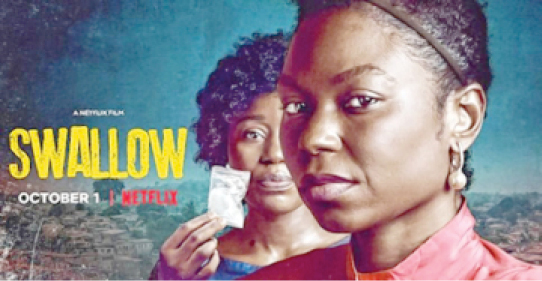Nigerian-American writer Sefi Atta’s second novel, “Swallow,” is now the subject of a Netflix movie.
The new Netflix movie “Swallow” is based on the novel of the same name by Nigerian American writer Sefi Atta. Netflix
Publisher (and musician) Michel Moushabeck of Northampton, at far left, says he’s thrilled to see Sefi Atta’s novel “Swallow” make it to film. “I hope many new readers will discover her work,” he says.
Back in the early 2000s, Sefi Atta was searching for a publisher for her first novel, “Everything Good Will Come,” a story of the friendship of two girls in Nigeria in the early 1970s and their growth into adulthood. She’d been writing for years even as she worked as an accountant, but this was her first serious attempt to get her long fiction published and hopefully take up writing full time.
Atta, a native of Nigeria who now lives in the U.S. but still spends time in Nigeria and in Great Britain, worked with her agent at the time to send her manuscript to a number of places. One of those businesses was Interlink Publishing of Northampton — and as Michel Moushabeck recalls, Atta’s novel was a revelation.
“It was this unsolicited manuscript that came across my desk,” Moushabeck, the founder and lead editor of Interlink, said in a recent phone interview. “I started reading it and I couldn’t put it down.
“It was insightful and deeply moving,” he said, “a coming of age story set against the backdrop of a war-torn country [the Nigerian Civil War of 1967-1970]. I had to publish it.”
Since then, Interlink has published four more novels, a short story collection, and a collection of plays by Atta, who has won widespread acclaim and awards for her work, including the Wole Soyinka Prize for Literature in Africa, a pan-African testimonial for the best literary work produced by an African.
In fact, it was “Everything Good Will Come,” published in 2005, that won that award, named for the Nigerian playwright and novelist who became the first Nobel laureate in literature from Africa.
Atta, born in 1964, is “one of the most original, imaginative and gifted fiction writers in Africa, and arguably the best of her generation,” as one critic puts it.
Now Atta, who came to the U.S. in 1994 with her husband, a doctor — the couple live in Mississippi — is likely reaching an even wider audience. Her second novel, “Swallow,” published in 2010, has been made into a Netflix movie by Nigerian filmmaker Kunle Afolayan. Atta also had a hand in writing the screenplay, an unusual arrangement in a business in which novelists rarely have much say in how their work is adapted for the screen.
It’s a big moment for Atta, who’s also written several stage and radio plays, and for Moushabeck, who founded Interlink Publishing in 1987 and publishes work from writers from around the world, including literature, history, politics, art, cuisine and children’s literature.
“We’re lucky to have her — Sefi has been a pleasure to work with,” said Moushabeck. “We’ve been able to translate her books into 13 languages; we’ve sold them in the U.K., in Italy, Germany, and several other countries. Now we’re happy to see her get this additional exposure.”
Moving to the movies
Atta, who recently was traveling in Nigeria, said in an email that she’s had a strong relationship for years with Interlink, one that “allows me complete creative freedom. I started off writing stories I needed to tell, then I wrote stories I wanted to tell, and they published them all, from my first novel to my latest, ‘The Bad Immigrant.’”
“I’m thankful to and for Michel,” she said. “He’s always an email away and his support gives me a sense of security that most writers don’t enjoy.”
Meanwhile, she said the prospect of seeing “Swallow” made into a film had made her excited but also nervous. She and Afolayan, the director, decided from the onset that the “film would have to be different from the novel,” Atta said. She also told him she “wanted to be part of the writing process, so I asked that we work on it together,” an arrangement Afolayan agreed to.
The novel, set in the 1980s, revolves around two young women, Rose and Tolani, in Lagos, Nigeria’s capital, who are trying to deal with either manipulative or deadbeat boyfriends, unsatisfying office jobs and, in Tolani’s case, a lecherous boss and an aging, fragile mother.
Rose, fired for slapping her boss when he makes unwanted sexual advances, becomes a drug mule to Great Britain, swallowing the contraband before plane flights, and she tries to enlist Tolani in this attempt to make quick money.
Atta, in her email, called the novel “a conversation between a daughter and her mother, in which they talk about societal pressures that have caused them to make decisions they are ashamed of.”
The film version of the story, though, “concentrates on the daughter’s struggles alone, and it’s more than a film about drug trafficking,” she said. “It is about the hustle culture in Lagos — its aspirants, winners and losers.”
For her part, Atta said she hadn’t realized there would be additional writing for the film after the final script was completed, nor that “there would be improvisations on set. However, improvisations are normal in Nigerian theater and I’m used to them as a playwright who’s had stage productions there.”
She’s since seen “Swallow” and is still “analyzing” it, as she does with her books post-publication. “What I can say is that Kunle Afolayan is an artist as well as a friend and I am most grateful he gave me an opportunity to work with him. I’ve learned a lot from the experience.”
And Moushabeck says he’s pleased at well with the release of Atta’s newest novel, “The Bad Immigrant,” a satire of sorts about a Nigerian family that moves to the U.S. and the struggles of the father, Lukmon, a literature professor and failed writer, to find his way in a new land and culture. Publisher’s Weekly calls the book “a trenchant and notable take on the immigrant experience.”
Moushabeck notes that Atta’s previous novels have made their way into any number of college-level comparative literature and African studies courses. With “Swallow” now a Netflix film, he added, “I hope many new readers will discover her work.”
https://www.recorder.com

 Join Daily Trust WhatsApp Community For Quick Access To News and Happenings Around You.
Join Daily Trust WhatsApp Community For Quick Access To News and Happenings Around You.


